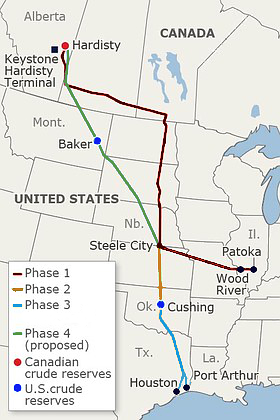June 26, 2014 report
Diverse group calls for moratorium on new oil sands development projects in Canada

(Phys.org) —A group that describes itself as "scientists spanning diverse disciplines" has published a Comment piece in the journal Nature, denouncing current policies surrounding extractions from oil sands in Canada that result in sending partially refined bitumen to other countries—mainly the U.S. via proposed pipelines. They are calling for an immediate moratorium on new sands-development until new processes and policies are put into place. At issue is the lack, the team claims, of policies that take into consideration more than just the costs or benefits of a single operation, or pipeline—what's needed is a global view that takes into consideration the impact of carbon emissions and the global warming that is occurring as a result.
Extracting oil from sand fields is a dirty business, on that, virtually everyone agrees. It causes clear environmental issues, such as destruction of boreal landscapes, elevated waterways, and concentration of contaminants that can harm people or animals. But it also destroys a valuable carbon sink, and worse, the oil that is extracted is eventually burned causing the release of more carbon into the atmosphere. The team of authors involved with the Comment piece suggest that those involved in the oil sand business take a look at the bigger picture or have regulators force them to do so. They note that what happens in Canada now, may have international implications as oil companies and policy makers in other parts of the world consider setting up similar operations.
The team notes that currently issues such as pipe construction costs, i.e. the Keystone XL and Enbridge Northern Gateway, tend to be ignored in the battle between oil companies and environmental groups. What's not being heard is that because pipes cost so much to build, it takes a long time to recoup the money invested, which means the pipes represent future pressure to continue sending oil, even if it's no longer needed, for many years to come.
Extracting oil in Canada is not just a Canadian issue, of course, with the U.S. as its biggest customer. Policies that impact such oil production face heavy pressure from politicians and big corporations in Canada's southern neighbor and therefore, they must be made a part of the process the authors acknowledge—but the ultimate objective, they insist, is that the policies that are created benefit the world at large, rather than business people and oil customers. Citing Canada's stated commitment to reducing carbon emissions, they suggest that "anything less demonstrates flawed policies and failed leadership."
More information: Energy: Consider the global impacts of oil pipelines, Nature 510, 465–467 (26 June 2014) DOI: 10.1038/510465a
Journal information: Nature
© 2014 Phys.org



















